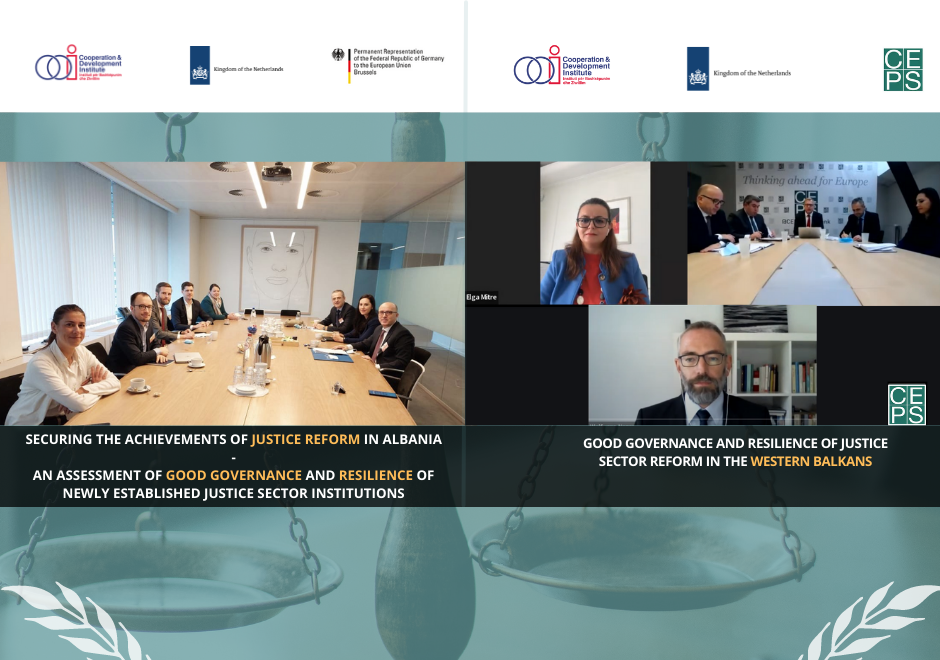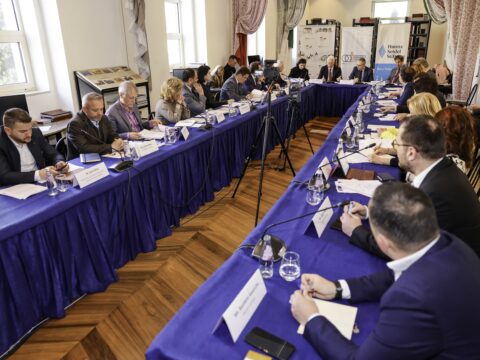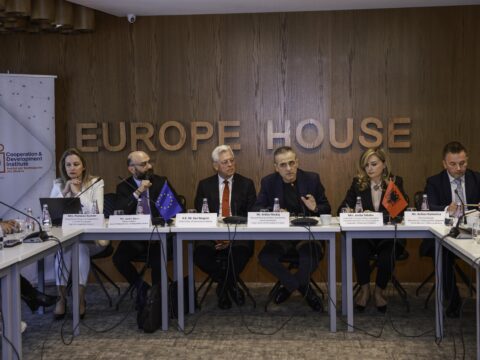CDI sharing its assessment on good governance of Justice Reform Institutions in a meeting with COWEB representatives in Brussels

B2B meeting session on “Maximizing the value of the real estate through the Certificate of Energy Performance (CPE)”
November 30, 2021
B2B Meeting on “Financing mechanism facility and businesses benefiting in energy efficiency in Albania”
December 7, 202124 November 2021
On 24 November 2021, a delegation from Cooperation and Development Institute (CDI) including its Director of Research and Coordinator of Tirana Connectivity Forum, Mr. Ardian Hackaj, Senior Expert Fjoralba Caka and Chief Justice Inspector Artur Metani were invited in a meeting with COWEB representatives in Brussels, jointly co-hosted by the Dutch and German Permanent Representation to the EU.
The meeting resulted a fruitful and intensive exchange of views on good governance and resilience of the newly established justice sector institutions in Albania; on the lessons learned of the justice reform in Albania for the New Enlargement Methodology; and how it may impact the delivery of IPA III financial allocation.
At the same day, CDI in cooperation with the Centre for European Policy Studies (CEPS) organized the hybrid event on “Good governance and resilience of justice sector reform in the Western Balkans”.
This initiative aims at bridging the knowledge and achievements reached so far in the framework the Berlin Process with the accession roadmap aiming at official opening of the negotiations with EU. In practical terms, this initiative aims to support and empower the stakeholders to engage actively in the reforms needed to progress by including also the challenges that the newly established institutions have with being well- governed and resilient.
In this framework, the event held in Brussels aimed to contribute to the transparency and accountability of new justice institutions in Albania by focusing on their good governance component.
The event was initially addressed by Mr. Steven Blockmans, Director at CEPS and co-author on the previous study “Securing the Resilience of Justice Sector Reform in Albania “, who laid down the overall context of the Justice Reform and its interconnection with Enlargement. Mr. Blockmans explained the application of ‘appreciative inquiry’ approach in this cycle of studies, which allows the authors to identify and assess features of the selected new or re-established structures belonging to the positive core of justice sector reform, such as vision, values, embedded knowledge, learning processes, organizational achievements, availability of technical and financial resources, efficacy, accountability, transparency and integrity.
Ms. Elga Mitre, Senior Policy Officer, Embassy of the Kingdom of the Netherlands in Albania, followed by explaining the ALBE project and how its two main themes such as “Connectivity” as in the Berlin Process Connectivity Agenda and the other one being “Accession Process” contribute to the institutional preparedness to push forward for the EU accession of the country. Ms. Mitre highlighted the role of CSOs in these processes as important interlocutors and the support of the Dutch Embassy to include these actors as well as support the deep-cutting reforms under the “strict fair and engaged” approach.
Mr. Ardian Hackaj, Director of Research at CDI Albania offered an overview of the innovative methodology and key outcomes of ALBE project with a particular focus on the sustainability and resilience of the new justice institutions as key benchmarks for its achievement and conditions to avoid democratic backsliding. In this regard, ALBE methodology brings in focus their good governance features of effectiveness, efficiency, transparency, accountability, predictability, sound financial management and of their integrity.
Ms. Fjoralba Caka, Senior Expert and Co-author of the study “Good Governance of New Justice Institutions in Albania” presented the study’s main findings while explaining the focus of the research and its novelties. “The justice reform so far has been mostly evaluated based on its outcomes. In our policy paper, we underline the important of focusing on the good governance aspect of the new justice institution because as we’re in a phase where the justice institutions and completing their set up phase, they would need to gain their own value and legitimacy,” Ms. Caka underlined. Ms. Caka mention the comprehensive analysis performed in the case of the policy paper on good governance components of human resources, budget, vision and internal rules of procedures for the new justice structures.
Ms. Artur Metani, High Inspector of Justice in Albania acknowledged that the fact that the justice reform is one of the deepest and largest institutional reforms in the country. “New institutions have been established or reorganized and compared to other Western Balkan countries, Albania can be considered as the leader of this reform process. In this context, Albania now being experienced with justice reform can help during the process of planning, implementing and monitoring institutional reforms in the Western Balkan countries”- said Metani.
However, Mr.Metani added the justice system has faced several challenges while establishing and making functional the new bodies, which have had a significant impact during the initial activity for the new institutions. The existence of technical or administrative obstacles which prevent the institutions from fully exercising them to increase its efficiency as well as taking measures for this reform to the yield results.
Mr. Bojan Maričić, Minister of Justice, North Macedonia acknowledged the fact that the Commission has given more prominence and leverage to the topic of rule of law and judiciary over time in the process of accession. “I would encourage the Member States to keep the focus on the rule of law over the process of accession, because it is actually crucial as everything else can be very well adopted and enacted through the legislative process. But the rule of law and judicial system is the only one that can have also a reversible process of worsening over time. So political stability and strong political will is a precondition for successful judicial reforms,”- said Mr. Maričić.
Mr. Wolfgang Nozar, Deputy Head of Unit, Directorate-General for Neighborhood and Enlargement Negotiations, EU Commission shared the Commission’s perspective on enlargement based on the revised new methodology. Mr. Nozar highlighted the support of the Commission, particularly in the field of rule of law. “Rule of law more broadly, is an absolutely core element for the accession negotiations. It’s important for the Commission, and I think it’s even more important for the Member States. So, our Western Balkan partners have to deliver in in this area. We provide a broad range of support, but we of course also aware that this is a complex process which takes time. I think it’s of our interest to ensure that we establish judicial systems that are well rooted in in society and that provide independent and accountable and efficient justice for all citizens,” – Mr. Nozar ended.
This event was organized in the framework of the initiative “Preparing and Supporting Albania for the EU accession process (ALBE): Monitoring and Supporting Albania’s reforms on its path to EU”, implemented by CDI and supported by the Dutch Embassy in Tirana through its MATRA program.
To consult the agenda of the event, please click here.
The video-streaming of the side event can be watched here.




